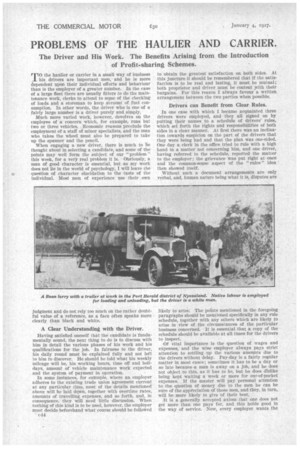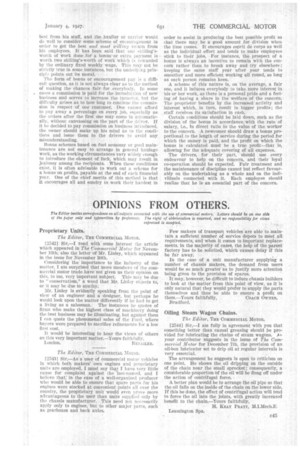PROBLEMS OF THE HAULIER AND CARRIER.
Page 66

Page 67

If you've noticed an error in this article please click here to report it so we can fix it.
The Driver and His Work. The Benefits Arising from the Introduction of Profit-sharing Schemes.
TO the haulier or carrier in a small way of business his drivers are important men, and he is more dependent upon their individual efforts and behaviour than is the employer of a greater number. In the case of a large fleet there are usually fitters to do the maintenance work, clerks to attend to some of the checking of loads and a storeman to keep account of fuel consumption. In other words, the driver who is one of a fairly large number is a driver purely and simply.
Much more varied work, however, devolves on the employee of a concern which, for example, runs but two or three vehicles. Economic reasons preclude the employment of a staff of minor specialists, and the man who takes the wheel must also be prepared to take up the spanner and the pencil.
When engaging a new driver, there is much to be thought about in selecting a candidate, and some of the points may well form the subject of our "problem" this week, for a very real problem it is. Obviously, a man of good character is essential, but as ray work does not lie in the world of psychology, I will leave the question of character elucidation to the taste of the individual. Most men of experience use their own
judgment and do not rely too much on the rather doubtful value of a reference, as a face often speaks more clearly than black and white.
A Clear Understanding with the Driver.
Having satisfied oneself that the candidate is fundamentally sound, the next thing to do is to discuss with him in detail the various phases of his work and his qualifications for the job. In fairness to the driver, his daily round must be explained fully and not left to him to discover. He should be told what his weekly mileage will be, his working hours, time off and holidays, amount of vehicle maintenance work expected and the system of payment in operation.
In some instances, for example, where an employer adheres to the existing trade union agreement current at any particular time, most of the details mentioned above will be laid dctwn, together with overtime rates, amounts of travelling expenses, and so forth, and, in consequence, they will need little discussion. When nothing of this kind is to be used, however, the employer must decide beforehand what course should be followed c44 to obtain the greatest satisfaction on both sides. At this juncture it should be remembered that if the satisfaction is to be real and lasting, it must be mutual; both proprietor and driver must be content pith their bargains. For this reason I always favour a written arrangement between the two parties when possible.
Drivers can Benefit from Clear Rules.
In one case with which I became acquainted three drivers were employed, and they all signed on by putting their names to a schedule of drivers' rules, which set forth the rights and responsibilities of both sides in a clear manner. At first there was an inclination towards suspicion on the part of the drivers that they were being had and that the plan was one-sided. One day a clerk in the office tried to rule with a high hand in a matter not concerning him, and one driver, having referred to the schedule, reported the matter to the employer ; the grievance was put right at once and the common-sense aspect of the " rules " idea ' then showed itself.
Without such a document arrangements are only verbal, and, human nature being what it is, disputes are likely to arise. The points mentioned in the foregoing paragraphs should be mentioned specifically in any rule schedule, together with any others which are likely to arise in view of the circumstances of the particular business concerned. It is essential that a copy of the schedule should be available at all times for the drivers to inspect.
Of vital importance is the question of wages and expenses, and the wise employer always pays strict attention to settling up the various amounts due to the drivers without delay. Pay-day is a fairly regular matter in most cases ; sometimes it has to be a day or so late because a man is away on a job, and he does not object to this, as it has to be, but he does dislike being kept waiting a week or more for out-of-pocket expenses. If the master will pay personal attention to the question of money due to the men he can be sure of the appreciation of those men, and they, in turn, will be more likely to give of their best.
It is a generally accepted axiom that one does not get more than one pays for, and this holds good in the way of service. Now, every employer wants the
best from his staff, and the haulier or carrier would do well to consider some scheme of encouragement it order to get the best and most willino rteurn from his employees. It has been said that one shilling'sworth of work done for a bonus or extra payment is worth two shilling's-worth of work which is rewarded by the ordinary fixed weekly wage. This may not be strictly true in some instances, but the underIy;ng principle points out its moral.
Tim form of bonus or encouragement pay is a difficult question, as it is not always clear as to the method of making the chances fair, for everybody, in some cases a commission is paid for the introduction of new business and serves to increase the turnover, but the difficulty Arises as to how long to continue the commieSion in respect of one customer. One cannot afford to pay away a percentage on every job, especially as the orders after the firstone may come in automatically, without canvassing on the part of the tir;ver. If it he decided to pay commission on business introduced, the owner should make up his mind as to the conditions and issue them to the drivers to avoid any misunderstanding.
Bonus schemes based on fuel economy or good maintenance are not easy to arrange in general haulage work, as the working circumstances vary widely enough to introduce the element of luck, which may result in jealousy among the recipients. When these conditions exist, it is often advisable to work out a scheme for a bonus on profits, payable at the end of each financial year. One of the chief merits of this method is that it encourages all and sundry to work their hardest in order to assist in producing the best possible profit so that there may be a good amount for division when the time eomes. It encourages esprit de corps as well as the individual effort and tends to make employees stick to their jobs. For instance, the prospect of a bonus is always an incentive to remain with the concern rather than to break away and try elsewhere; keeping the same staff year after year tends to smoother anti more efficient working all round, so long as each person remains keen.
A scheme of this nature is, on the average, a fair one, and it induces everybody to take more interest in his or her work, as there is a personal pride and a feeling of having a share in the welfare of the concern. The proprietor benefits by the increased activity and interest which, in turn, result in bigger profits; the staff receives its satisfaction in cash.
Certain conditions should be laid down, such as the division of the bonus in accordance, with the rate of salary, i.e., in direct ratio to the value of the worker to the concern. A newcomer should draw a bonus proportional to the length of service during the period for which the money is paid, and the profit on which the bonus is calculated must be a true profit—that is, allowing for the adequate covering of all expenses.
The drivers, for their part, should use every endeavour to help on the concern, and their loyal co-operation should be expected. Fair treatment and the maintenance of discipline cannot but reflect favourably on the undertaking as a whole and on the individuals connected with it. Each employee should realize that he isan essential part of the concern.












































































































